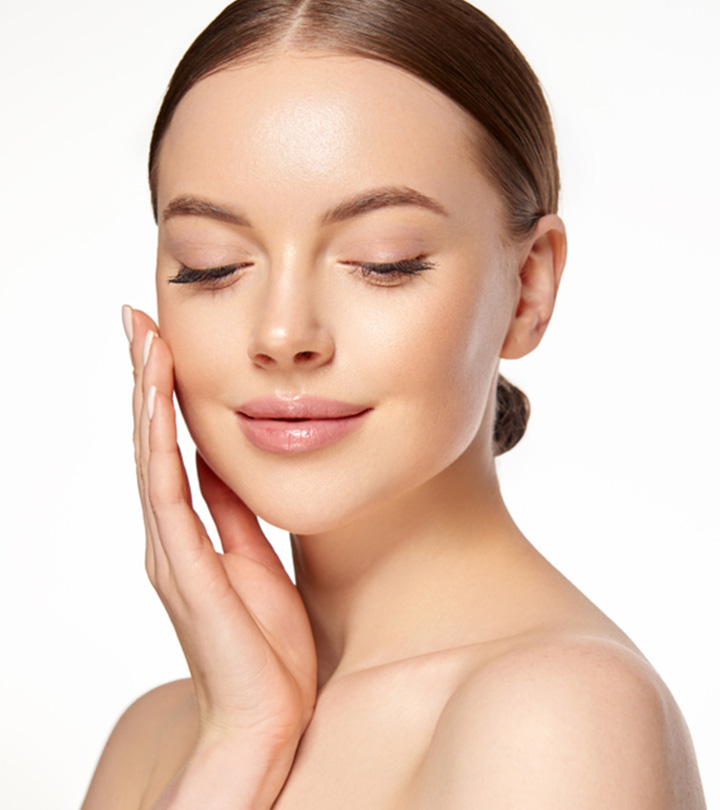The benefits of sodium PCA for skin are so wide-ranging that almost all lotions, creams, shampoos, and serums use this ingredient. This plant-based humectant locks up the moisture in the skin and keeps it hydrated.
It can help reduce the risk of dry skin disorders like eczema, improve skin barrier function, and slow down signs of premature aging.
In this article, we have explained the benefits of this natural humectant, its potential side effects, and the best ways to use it. Let us get started.
In This Article
What Is Sodium PCA?
Sodium PCA is a natural plant-based humectant that seals skin moisture to replenish and hydrate it. It is a salt derived from proline (an amino acid). It attracts water droplets from your environment and seals them in your skin. This ingredient is also found in hair care products like shampoos and hairsprays for its conditioning effects.
Interestingly, sodium PCA is also formed when a type of protein (called filaggrin) breaks down due to a reaction with dead skin cells (also called corneocytes). Thus, the natural moisturizing factor of your skin already consists of 12% sodium PCA made of tiny proteins, sugar, amino acids, and lactic acid. These, together, keep your skin’s surface healthy and hydrated.
Stylecraze Trivia Sodium PCA is typically produced synthetically. It can also be extracted from coconut oil, fruits, soybean, and some types of grasses.
We look at the benefits of sodium PCA in the next section.
What Are The Benefits Of Sodium PCA?
Shutterstock
1. May Diminish Signs Of Aging
Sodium PCA is naturally found in your body. But its levels reduce with increasing age, causing premature signs of aging. Hence, incorporating sodium PCA-based skincare products into your regimen can help.
Sodium PCA may delay the onset of common aging signs like wrinkles and fine lines. It works by enhancing the skin’s ability to hold water (1).
2. Helps Hydrate Skin
The hygroscopic (absorbing moisture from air) properties of sodium PCA allow it to trap water inside your skin. Most skin care products contain 1 to 2% sodium PCA, which is sufficient to keep dryness at bay (2) . Sodium PCA enters the uppermost skin layer and subsequently passes to the inner layers, keeping skin hydrated from within.
Related: Dehydrated Skin: Causes, Symptoms, And How To Care For It
3. Helps Maintain The Skin Barrier
Shutterstock
Studies show that sodium PCA improves the skin’s protective barrier by preventing moisture loss (3). It also reinforces the intercellular glue to keep the skin cells together. It prevents the growth of bacteria and allergens that causes acne and breakouts and clog pores. In addition, when you protect your skin’s natural barrier, you also immunize it against environmental aggressors such as pollutants and UV rays.
4. May Treat Eczema
Eczema is caused when dryness and inflamed skin lead to excess irritation, itching, and scaling. As per research, sodium PCA, in combination with other skin protective additives, can help treat issues like eczema. Sodium PCA seems to be an efficient solution (4). You can observe results within two weeks from use. It also may enhance skin texture, reduce eczema symptoms, and increase skin moisture levels.
Related: Eczema Scars: 10 Effective Ways To Improve Their Appearance
5. Is Non-Comedogenic
Shutterstock
Sodium PCA is non-comedogenic. It does not clog pores. It makes the perfect choice for oily and acne-prone skin. However, more research is warranted in this regard (5).
Stylecraze Trivia Sodium PCA is a non-irritant ingredient that can reduce inflammation. Also, it is conveniently available in OTC treatments.
These are the few important benefits of sodium PCA. But how can you make use of it? Keep reading to know more.
How To Use Sodium PCA For Skin?
Skincare products like lotions, creams, shampoos, serums, and gels usually contain sodium PCA. Your go-to product will probably give you all the sodium PCA you need.
The concentration levels of sodium PCA in skincare and cosmetic products remain between 0.2 to 40%. The chemical may not irritate your skin even at concentrations up to 50%. However, consult your dermatologist to understand the concentration ideal for you.
Sodium PCA is often compared with hyaluronic acid. But how are the two different?
Sodium PCA Vs. Hyaluronic Acid
Shutterstock
Hyaluronic acid is found in many skincare products due to its moisture-binding abilities. Sodium PCA works like hyaluronic acid and helps enhance your skin’s moisture content. Both these moisturizing agents are natural humectants, but they only differ in terms of their functioning.
Hyaluronic acid can hold up to 100 times its weight in water. In comparison, sodium PCA can hold up to 250 times its weight when dissolved in water. The latter is more effective in sealing skin moisture. Besides, sodium PCA is 1.5 times more effective than glycerine and twice as potent as propylene glycol.
Like most other ingredients, sodium PCA also poses a few risks. We discuss them in the next section.
Related: How To Use Hyaluronic Acid And Vitamin C To Rehydrate Your Skin
Side Effects And Risks Of Sodium PCA
Shutterstock
Reports from the International Journal of Toxicology suggest that sodium PCA is safe for use in skincare products. Sodium PCA is also a non-sensitizing ingredient and generally does not irritate your skin. It also may work well on all skin types.
Topically applied sodium PCA will not penetrate the skin deeper than required. However, it must not be mixed with cosmetic or skincare products with nitrosating ingredients as the two can react and produce carcinogenic substances.
Sodium PCA is a plant-based humectant commonly used in a wide variety of cosmetic products. Some of the benefits of using sodium PCA may include slowing down skin aging, moisturizing the skin, and may help manage skin conditions such as eczema. What differentiates sodium PCA from hyaluronic acid is its ability to seal moisture effectively. Studies suggest that sodium PCA is safe for use and is suitable for all skin types. Make sure to not mix it with other skincare products containing nitrosating ingredients to avoid any reaction. Consult a dermatologist for the right dosage and instructions.




